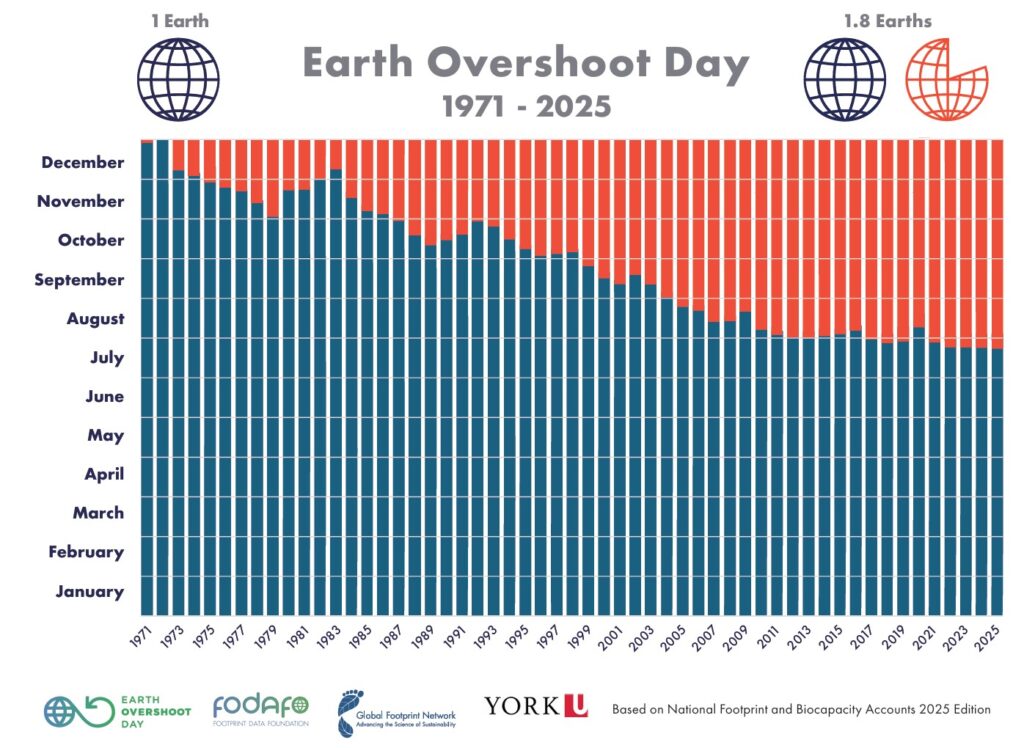WWF: World Overconsumption Day has arrived earlier than ever before
In 2025, Earth Hour Day has arrived earlier than ever before – more than a week earlier than last year. The trend is worrying: humanity is increasingly using up the planet’s natural resources, while the very systems that underpin our sustainable lives – forests, water, soils and ecosystems – are collapsing. Systemic decisions and actions are needed to make a difference, and individuals have a key role to play in strengthening and driving these processes through their choices.

Earth Hour Day marks the day of the year when humanity has used up as many natural resources as the Earth can produce or renew in a year. According to the Global Footprint Network, this year it falls on July 24 – more than a week earlier than in 2024, when it fell on August 1. This is not just a date on the calendar, but an alarming symptom that the ecological balance of our planet is increasingly being upset.
Although individual responsibility and commitment have never been more important, systemic changes are absolutely essential, as the main driving force of current overconsumption is the unsustainability of production and consumption systems. The responsibility of governments, companies and other decision-makers plays a key role in why we are now heading in such a bad direction.
Due to numerous erroneous decisions and irresponsible consumption, and ill-considered landscape use, natural systems and resources in Hungary are also facing increasingly serious challenges. The drying up of our wetlands, agricultural overuse, logging that is allowed even in protected forests, and other unsustainable practices are putting domestic ecosystems under increasing pressure. Meanwhile, the effects of climate change are becoming more and more tangible: dry summers, extreme storms and the loss of natural habitats all warn us that we need to change. And this affects not only wildlife but also us, humans: just think of the temporary restrictions on water use in some of our settlements during the current dry summer.
“If we don’t change, by 2050 we could use up the Earth’s resources for a year in the first half of the year. In such a future, nature will be only a faint memory of itself: our fertile soils will become even more depleted, our natural habitats will continue to fragment and impoverish, and the populations of endangered species will continue to decline – in fact, many species may disappear permanently. Meanwhile, waste from short-lived, unnecessarily manufactured products will continue to accumulate, which will stay with us for centuries. This not only portends an environmental crisis, but also a serious social and economic crisis – with food supply disruptions, water shortages and health risks,”
warns Zoltán Fehér, head of conservation at WWF Hungary.
Related news
Fashion, drones and sustainability – the new face of agriculture at the AgriTech InnoExpo event
🎧 Hallgasd a cikket: Lejátszás Szünet Folytatás Leállítás Nyelv: Auto…
Read more >dm welcomes customers with stable prices and a superb price-value ratio
🎧 Hallgasd a cikket: Lejátszás Szünet Folytatás Leállítás Nyelv: Auto…
Read more >Related news
Nestlé to sell remaining ice-cream assets but commits to Froneri venture
🎧 Hallgasd a cikket: Lejátszás Szünet Folytatás Leállítás Nyelv: Auto…
Read more >Lidl guarantees fairer prices for cocoa farmers
🎧 Hallgasd a cikket: Lejátszás Szünet Folytatás Leállítás Nyelv: Auto…
Read more >








